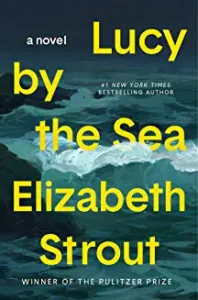Lucy at Sea by Elizabeth Strout 2022
When I last saw Lucy Barton, she was in the throes of a divorce, an illness, children, and a cold, loveless mother. That book ended with the phrase, “All life amazes me.” There have been several novels about Lucy since then, but this is the first I’ve read, and I found Lucy, now 71 years old, as she is whisked out of New York City by her ex-husband, William (no doubt, the same William from her last book “Oh, William” which I have not yet read but which has been short-listed for the Booker) as the COVID pandemic is just beginning. As William tells her, his aim is to save her life.
Lucy and William end up in Crosby, Maine a small town on the ocean where they begin a new life, one that is overshadowed by the deaths of friends and family as COVID sweeps the pre-vaccine 2020 and that is characterized by a break with their past habits, relationships, and experiences. Lucy is a successful novelist and William a professor of parasitology, but in Maine they are the target of “New Yorkers go home” signs and slurs. They find a way to be together again as William explores his new family through a half-sister he never knew about and Lucy deals with the life challenges of her adult daughters. All of this occurs against the backdrop of the growing pandemic, the failures of ‘our current president’, and the January 6th insurrection on TV.
Precious little happens in these 288 pages, yet one is swept along as if it’s a page-turning thriller. Strout uses the first person narrator so there is the immediacy of Lucy’s observations and inner thoughts, and it feels like she’s sharing them with you over a cup of coffee or a glass of wine. Often the little action that does happen is punctuated by Lucy’s thoughts: “I went through the days—I don’t know how I went through them”. This is just about the most perfect summary of March through May of 2020 that I’ve read. She goes on to share these thoughts: “I had a sense of being dazed. As though, in a way, I was not capable of taking in everything that was happening in this world.” (This sounds like how I felt night after night watching the PBS News Hour) ; “The days went by, but I do not really remember how.” (Where did 2020 go?) ; “It is a gift in this life that we do not know what awaits us.”; “We are only doing what we can to get through.”; “I could not stop feeling that life as I had known it was gone.” (So true!) Lucy’s thoughts comprise the best summary of what I felt during those early months of COVID, and this is Strout’s gift, creating a character who feels real and who can makes the world more real through interpreting it.
Along the way, Lucy develops the kind of understanding that will be necessary for a healing of the abyss in our country. She senses the impact of poverty and the anger that results from intellectual, wealthy elites sneering at those with less education, money, status. Some of this is stated in her thoughts but the most powerful example is her empathy and support for a woman she met volunteering at the Food Pantry who is an anti-vaxer and Trump bumper sticker owner. In one of her clever techniques, Strout has this woman describe her favorite person at the nursing home where she is employed as a maid—Olive Kittridge!
Whether it’s Lucy’s age, her relocation to New England, her two daughters with all of their adult complexity, or some combination, I was quite affected by the book and highly recommend it.



